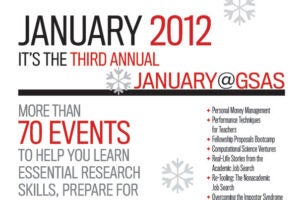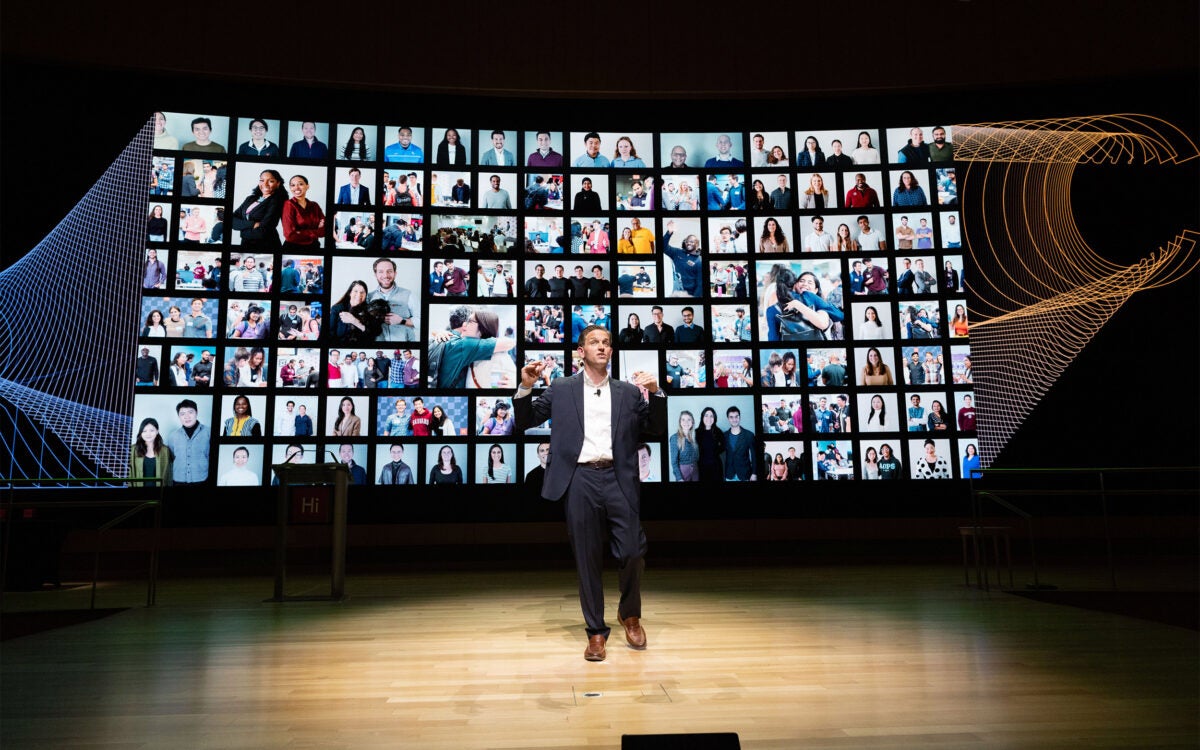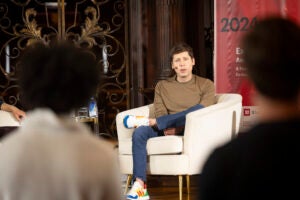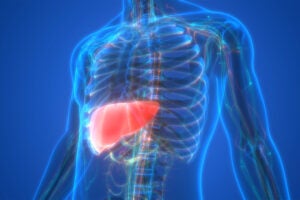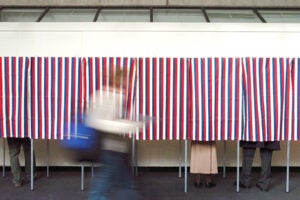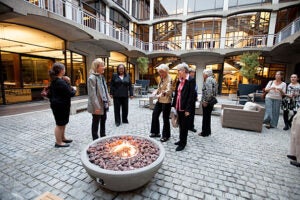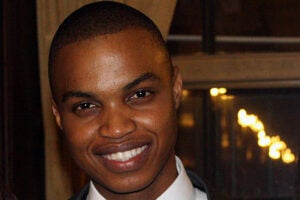Tag: Reuell
-
Science & Tech
Ancient Iraq revealed
Jason Ur, the John L. Loeb Associate Professor of the Social Sciences, earlier this year launched a five-year archaeological project — the first such Harvard-led endeavor in the war-torn nation since the early 1930s — to scour a 3,200-square-kilometer region around Irbil, the capital of the Kurdish region in northern Iraq, for the signs of…
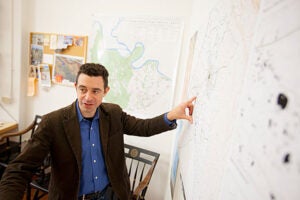
-
Health
Sophisticated worms
In a new study of worm locomotion, researchers show that a single type of motor neuron drives an entire sensorimotor loop.
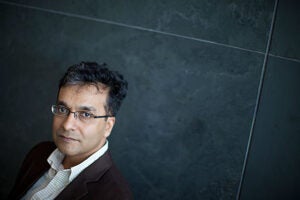
-
Campus & Community
Rhodes selects six Harvard students
Six Harvard undergraduates are among the 32 American men and women chosen as Rhodes Scholars on Sunday. They will begin their studies at the University of Oxford in October 2013.
-
Science & Tech
Intelligent Earth
Once its axis tilts, how does the Earth “know” to return to its normal orientation? Work by Harvard researchers provides some answers.
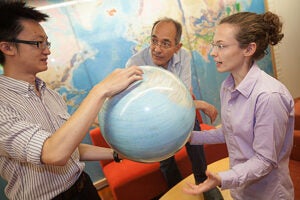
-
Campus & Community
Growing community for students
At the start of the fall semester, the popular Graduate Commons program was expanded to include two additional buildings, more than doubling the number of units included in the program.
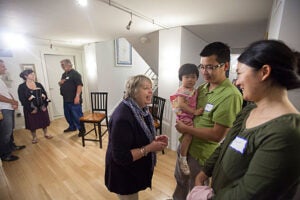
-
Health
Molecular motion in detail
In a critical breakthrough in unraveling how molecular “motors” ferry proteins and nutrients through cells, Harvard scientists have produced high-resolution images that show how the chemical “foot” of dynein — one of the most complex, but least understood such motors — binds to microtubules, the cellular structures it travels on.
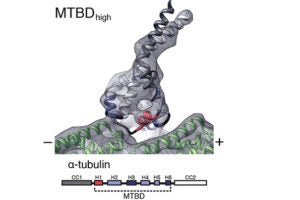
-
Health
Controlling behavior, remotely
Researchers have been able to take control of tiny, transparent worms by manipulating neurons in their brains, using precisely targeted pulses of laser light.
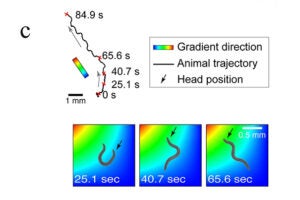
-
Science & Tech
Soft robots go for color, camouflage
Researchers have developed a system — inspired by nature — that allows soft robots to either camouflage themselves against a background, or to make bold color displays. Such a “dynamic coloration” system could one day have a host of uses, ranging from helping doctors plan complex surgeries to acting as a visual marker to help…
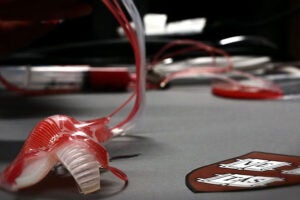
-
Health
Stars in the making
A paper authored by Harvard’s Eli Visbal with colleagues from the California Institute of Technology and Tel Aviv University suggests that it may be far easier than commonly thought to peer deep into the universe’s history and observe the telltale signs of the formation of the first stars and galaxies.
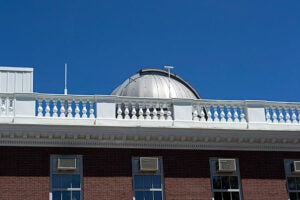
-
Health
Health care savings, naturally
Though questions persist about whether natural remedies are as effective as their pharmacological cousins, one Harvard researcher is trying to understand the economic benefits people receive by relying on such traditional cures.
-
Science & Tech
Concerns about climate change, health
A team of researchers led by James G. Anderson, the Philip S. Weld Professor of Atmospheric Chemistry, warns that a newly discovered connection between climate change and depletion of the ozone layer over the U.S. could allow more damaging ultraviolet (UV) radiation to reach the Earth’s surface, leading to increased incidence of skin cancer.
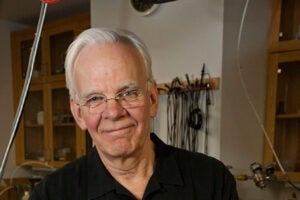
-
Science & Tech
Stages of superconductivity
Harvard physicists say they have unlocked the chemical secret that controls the “fool’s gold” of superconductivity, a “pseudogap” phase that mimics, but doesn’t have all the advantageous properties of, superconductivity.
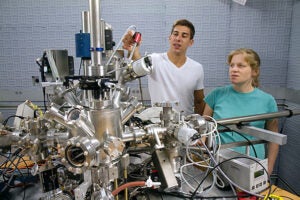
-
Health
Transforming cancer treatment
Professor Martin Nowak is one of several co-authors of a paper, published in Nature on June 28,that outlines a new approach to cancer treatment that could make many cancers manageable, if not curable, by overcoming resistance to certain drug treatments.
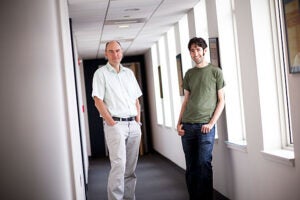
-
Health
The growing brain
As reported on June 7 in the journal Neuron, a team of researchers led by Professor Jeff Lichtman has found that just days before birth mice undergo an explosion of neuromuscular branching. At birth, the research showed, some muscle fibers are contacted by as many as 10 nerve cells. Within days, however, all but one…
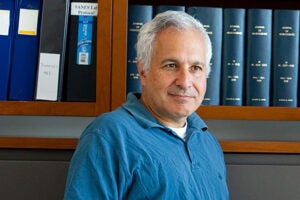
-
Science & Tech
Straight to the source
As described in an April 23 paper in the Proceedings of the National Academy of Sciences (PNAS), graduate students Eric Morrow and Carling Hay demonstrate the use of a statistical tool called a Kalman smoother to identify “sea level fingerprints” — telltale variations in sea level rise — in a synthetic data set. Using those…
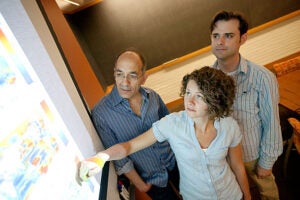
-
Health
Signs of progress against PTSD
A decade after the start of the wars in Afghanistan and Iraq, studies have shown that the incidence of post-traumatic stress disorder (PTSD) among troops is surprisingly low, and a Harvard researcher credits the drop, in part, to new efforts by the Army to prevent PTSD, and to ensure that those who develop the disorder…
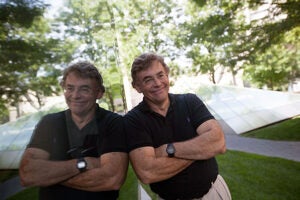
-
Health
Turing was right
Researchers at Harvard have shown that Nodal and Lefty — two proteins linked to the regulation of asymmetry in vertebrates and the development of precursor cells for internal organs — fit a mathematical model first described by Alan Turing six decades ago.
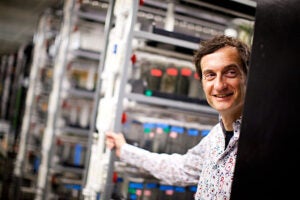
-
Science & Tech
Elegant entanglement
Harvard scientists have taken a critical step toward building a quantum computer — a device that could someday harness subatomic particles such as electrons to perform calculations far faster than the most powerful supercomputers.
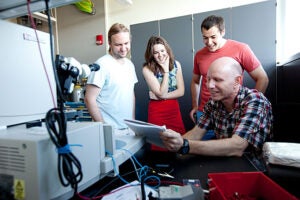
-
Campus & Community
A peek into Harvard classrooms
The Faculty of Arts and Sciences is launching a new video series, called “Harvard’s Great Teachers,” which will highlight Harvard’s world-class faculty and offer a sampling of the exciting and innovative teaching experienced by Harvard students.
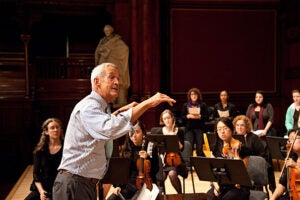
-
Science & Tech
New frontier in archaeology
Jason Ur, the John L. Loeb Associate Professor of the Social Sciences, worked with Bjoern Menze of MIT to develop a system that identified ancient settlements based on a series of factors — including soil discolorations and the distinctive mounding that results from the collapse of mud-brick settlements.
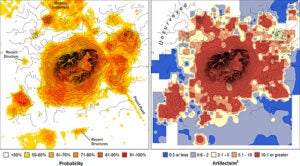
-
Health
Rock sleuths
In one of the largest studies of its kind, Harvard researchers have found that carbon records from the mid-Neoproterozoic era can be “read” as a faithful snapshot of the surface carbon cycle between 717 million and 635 million years ago, a finding that directly challenges a decades-long belief of most scientists.
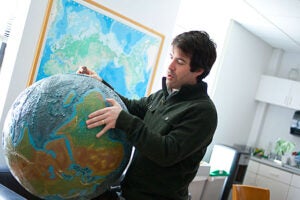
-
Campus & Community
A peek at Harvard’s future
Maya Jasanoff and her faculty colleagues gathered at the Tsai Auditorium on Feb. 16 and March 7 to consider how the Faculty of Arts and Sciences (FAS) may look in a generation. The discussions were part of the Conversations @ FAS series, which this year asks some of Harvard’s leading scholars to imagine the faculty…
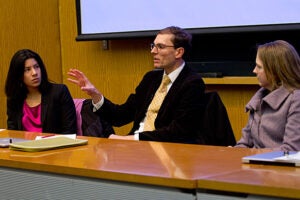
-
Science & Tech
A new view of DNA
A new imaging technique, developed by Erez Lieberman-Aiden, a Junior Fellow of the Society of Fellows, is giving scientists their first three-dimensional view of the human genome, one that is already shedding new light on a number of what Liberman-Aiden calls the “central mysteries of biology.”
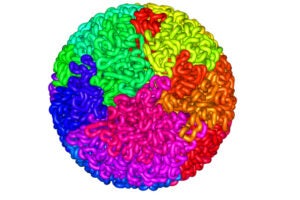
-
Health
In the genes, but which ones?
A team of researchers, led Harvard Professor David I. Laibson and Christopher F. Chabris of Union College, has found that virtually all claims that intelligence is associated with specific genes are wrong.
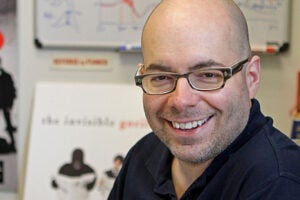
-
Nation & World
Fostering global understanding
A panel of scholars made up of the directors of the Prince Alwaleed Bin Talal Centers met to discuss how to promote better understanding between the Islamic world and the West.
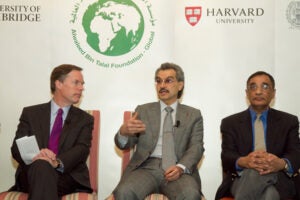
-
Campus & Community
GSAS Dean Allan Brandt to step down
Harvard Graduate School of Arts and Sciences Dean Allan M. Brandt, who pioneered a new approach to curricular development with the launch of the Graduate Seminars in General Education, announced Feb. 15 that he will step down as GSAS dean this spring owing to health considerations. He plans to return to the faculty when his…
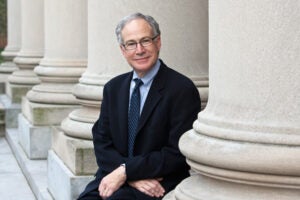
-
Campus & Community
In January, a learning smorgasbord
Graduate students and others will be able to take part in January @ GSAS, a series of more than 80 workshops, seminars, and classes on topics that range from how to write fellowship proposals, to using online citation tools when conducting research, to social events such as film screenings and tours of Harvard museums.
